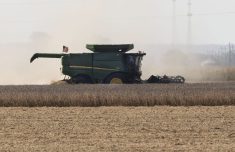The Western Hog Exchange has promised to audit staff and its facilities after an undercover video showed alleged abuse of pigs this summer at an assembly yard in Red Deer.
The video produced by the animal rights group Mercy for Animals was turned over to the national news program W-5, which in turn showed it to Western Hog Exchange manager Brent Moen.
“They showed us a number of things that were disturbing to see and against our policy relative to the level of animal care we want to have,” Moen said yesterday.
Read Also

Trump mulls ending some trade ties with China, including in relation to cooking oil
U.S. President Donald Trump said on Tuesday Washington was considering terminating some trade ties with China, including in relation to cooking oil.
He asked for the unedited video to be turned over to the Canadian Food Inspection Agency and the SPCA so action could be taken, but he is unaware of whether that has happened.
It is believed a person hired to work at the assembly yards took the video and then left after about two months of employment.
After seeing the video, the company hired third party auditors to evaluate the facility and staff procedures.
“They are going to come back with recommendations on things we should implement and we are going to address those things and move them forward,” said Moen.
The national pork quality assurance program includes an animal welfare component. In order to sell to a federal plant, pork producers must be certified under the quality assurance program.
The welfare component evaluates animal conditions, including facilities where animals could be injured on slippery floors, in alleyways or during loading.
Producers are also encouraged to get regular training on animal handling and transportation techniques, said Darcy Fitzgerald of Alberta Pork.
“Our guys are doing a good job and the way they can do a better job is to look at what the rules and regulations are,” he said.
In Alberta, staff shortages are a daily reality, but potential employers need to check references and records and offer probation periods.
“If we are doing the right thing, we shouldn’t be worried about the employees who work there. The people who are taking these videos, I would question whether they are concerned about the welfare of animals or is their concern to stop livestock agriculture,” Fitzgerald said.

















